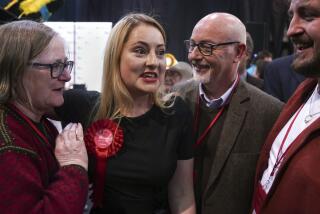Thatcher Is Called ‘Out of Date’ : British Labor Now Fit to Rule, Kinnock Says
- Share via
BRIGHTON, England — Opposition leader Neil Kinnock said Tuesday that Conservative Prime Minister Margaret Thatcher is “out of touch, out of date, and out of step with the British people” and that his newly moderate Labor Party is now “fit to serve our country.”
Kinnock delivered what colleagues said was perhaps his most important speech at the Labor Party’s annual conference at this beach resort on England’s south coast. But it was directed to a much wider audience--the British voters who have rejected a more radical Labor brand of pacifist socialism in the last three general elections.
The 47-year-old Welshman is credited with engineering a crucial reorientation of the party, which culminated here Monday when delegates approved by a 3-to-2 margin the abandonment of its advocacy of unilateral nuclear disarmament.
The party has also modified its stand on the nationalization of key industries, on income taxes and Britain’s role in Europe in order to appeal to a broader base of voters.
‘No Longer Anti-Capitalist’
“Labor is no longer an anti-capitalist, anti-Europe, anti-nuclear party,” the London Observer commented in a weekend editorial.
The daily Independent said, “Neil Kinnock and the party he leads are looking better than they have done at any time since he took office in 1983.”
Combined with a series of setbacks for the Conservatives, the change in Labor’s image is seen as giving the party its best chance for ousting Thatcher since she took office more than 10 years ago.
As party delegates gathered for the conference, the polls showed Labor anywhere from 5 to 11 percentage points ahead of the Conservatives. Less than a year ago, Labor was more than 10 points behind.
“The people of Britain know that we have worked for and earned our increased strength,” a buoyant Kinnock told a packed arena here Tuesday. “Increasingly they know that we are attuned to the realities of our time. Increasingly, they are prepared to trust us with the future. People tell me that when I meet them. The polls tell us that when we read them.”
Labor’s greatest problem may be that there is still a long time until the next elections. Thatcher need not call them until mid-1992 if she chooses not to do so, and this gives her nearly three years to turn the tide of public opinion.
Needs Midlands, Southeast
Also, Labor’s recent gains at the polls have often been in constituencies where they already had a wide margin of support over the Conservatives. Where it really needs votes if it is to pull off what would be the most massive electoral swing since 1945 is in the Conservative strongholds--the Midlands and the wealthy Southeast.
The polls also show that while many voters like Labor’s opposition to such unpopular government proposals as reform of the National Health Service and privatization of the electrical and water utilities, they still see the Conservatives as the more trustworthy managers of the national economy.
Most of all, according to critics both in and out of the party, what Kinnock lacks is a powerful theme that could provide a counter to Thatcherism.
“Nobody quite has an answer to the question: ‘Why Labor for the ‘90s?’ ” the Independent’s political columnist, Peter Jenkins, commented Tuesday. “Brains are racked, in vain, for that elusive ‘big idea’--what comes after Mrs. Thatcher?”
Many had hoped that Kinnock might put forth a formula in his speech Tuesday, but he did not. Instead, he delivered a one-hour address that political commentators characterized as remarkably muted and sober. He scored his biggest oratorical points when lambasting Thatcher’s style and policies.
He delighted deligates when he quoted a constituent as saying that Conservatives “are people who start off promising you the Earth and end up selling you the water.”
He got a laugh when he noted that Thatcher is often criticized for being remote. “I wouldn’t have said that,” Kinnock said. “I’ve seen her rubbing shoulders with the crowds, talking to the children, traveling on a train. Pity it was in Japan.”
Kinnock hit hard at what is often called the “economic miracle” that Thatcherism has worked in a newly prosperous Britain.
2 Million Unemployed
“We’ve had oil wealth that none of our major competitors have had,” he said, “and at the end of that 10 years, Britain’s got 2 million unemployed, the highest inflation rate of any major industrialized country, the highest interest rates of any industrialized country, the biggest balance of payments deficit of all the major industrial countries.”
Kinnock offered few specifics about what a Labor government with him as prime minister would do differently.
“Research and development, transport and communications, science, training and education, they are our priorities,” he said.
He was more specific on a key element of political strategy. Labor will challenge the Conservatives alone rather than seek any alliance with Britain’s smaller, centrist parties, he said, adding: “It is the winning way. And we’ll keep on winning--with no wheeling, no dealing, no horse-trading and no electoral pacts.”
Next week the Conservatives will have their party conference in Blackpool.
More to Read
Sign up for Essential California
The most important California stories and recommendations in your inbox every morning.
You may occasionally receive promotional content from the Los Angeles Times.













